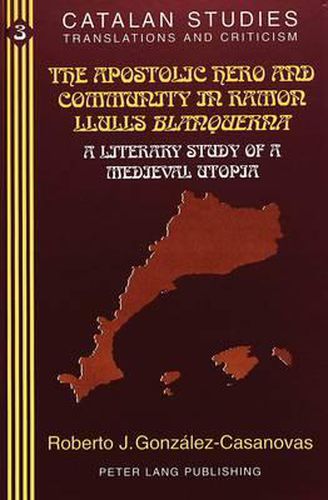Readings Newsletter
Become a Readings Member to make your shopping experience even easier.
Sign in or sign up for free!
You’re not far away from qualifying for FREE standard shipping within Australia
You’ve qualified for FREE standard shipping within Australia
The cart is loading…






This study examines a masterpiece of medieval religious literature, Blanquerna (1283), written in Catalan by Ramon Llull (1232-1316), Doctor Illuminatus and Apostle to Islam, better known for his theological systems and missionary works. Blanquerna is a popular utopia about reconverting Christians, reforming Rome and all Christendom, and evangelizing infidels and pagans: it shows Blanquerna’s spiritual journey as he reforms monastery and countryside, cathedral and city, papacy and Church, and then writes a contemplative guide and mystical allegory. This study applies critical theories of historicism, reception, genre, and rhetoric to a detailed analysis of Blanquerna, as fictional hagiography and apostolic utopia, so as to examine cultural contexts, religious narrative, and exemplary textuality. It relates the novel to Llull’s autobiography, literary works, and missionary arts; considers parallels in popular preaching, didactic works and reform movements; and compares exemplary typology and narratology in Blanquerna and in the Castilian version of Barlaam.
$9.00 standard shipping within Australia
FREE standard shipping within Australia for orders over $100.00
Express & International shipping calculated at checkout
This study examines a masterpiece of medieval religious literature, Blanquerna (1283), written in Catalan by Ramon Llull (1232-1316), Doctor Illuminatus and Apostle to Islam, better known for his theological systems and missionary works. Blanquerna is a popular utopia about reconverting Christians, reforming Rome and all Christendom, and evangelizing infidels and pagans: it shows Blanquerna’s spiritual journey as he reforms monastery and countryside, cathedral and city, papacy and Church, and then writes a contemplative guide and mystical allegory. This study applies critical theories of historicism, reception, genre, and rhetoric to a detailed analysis of Blanquerna, as fictional hagiography and apostolic utopia, so as to examine cultural contexts, religious narrative, and exemplary textuality. It relates the novel to Llull’s autobiography, literary works, and missionary arts; considers parallels in popular preaching, didactic works and reform movements; and compares exemplary typology and narratology in Blanquerna and in the Castilian version of Barlaam.